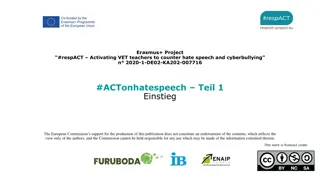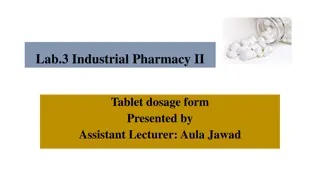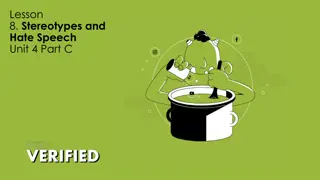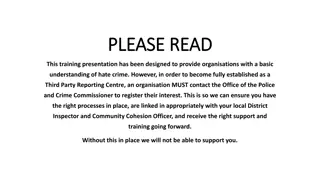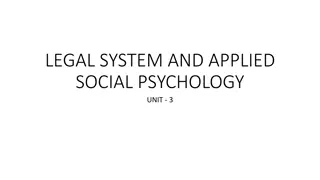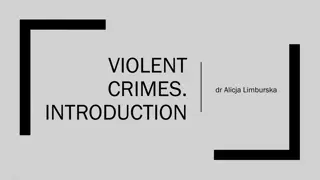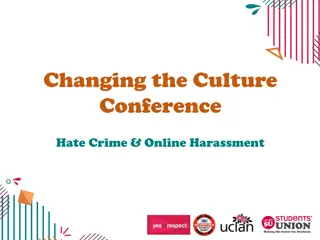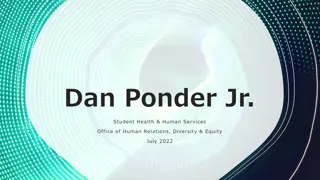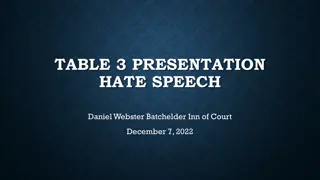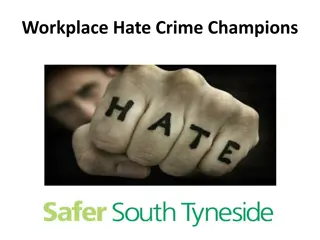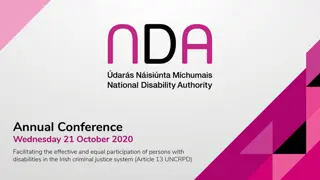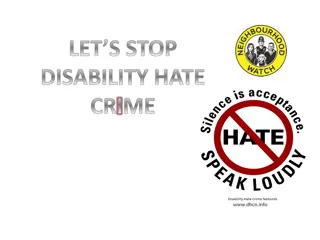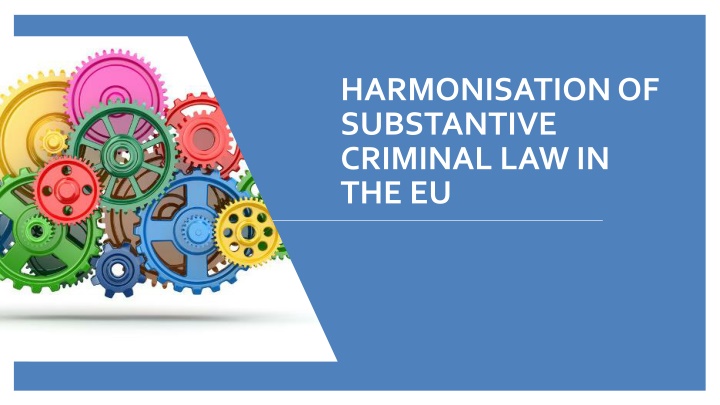
Harmonisation of Substantive Criminal Law in the EU - Treaty of Lisbon Legal Basis
Explore the legal basis of harmonisation in the EU regarding substantive criminal law under the Treaty of Lisbon, including directives for defining criminal offenses and sanctions in areas such as terrorism, trafficking, and organized crime. Learn about the principles of mutual recognition of judgments and the approximation of laws among Member States to combat serious cross-border crimes effectively.
Uploaded on | 2 Views
Download Presentation

Please find below an Image/Link to download the presentation.
The content on the website is provided AS IS for your information and personal use only. It may not be sold, licensed, or shared on other websites without obtaining consent from the author. If you encounter any issues during the download, it is possible that the publisher has removed the file from their server.
You are allowed to download the files provided on this website for personal or commercial use, subject to the condition that they are used lawfully. All files are the property of their respective owners.
The content on the website is provided AS IS for your information and personal use only. It may not be sold, licensed, or shared on other websites without obtaining consent from the author.
E N D
Presentation Transcript
HARMONISATION OF SUBSTANTIVE CRIMINAL LAW IN THE EU
Treaty of Lisbon legal basis of harmonisation Article 82 Judicial cooperation in criminal matters in the Union shall be based on the principle of mutual recognition of judgments and judicial decisions and shall include the approximation of the laws and regulations of the Member States in the areas referred to in paragraph 2 (criminal procedure rules) and in Article 83 (substantive criminal law).
Treaty of Lisbon legal basis of harmonisation Article 83 1. The European Parliament and the Council may, by means of directives adopted in accordance with the ordinary legislative procedure, establish minimum rules concerning the definition of criminal offences and sanctions in the areas of particularly serious crime with a cross-border dimension resulting from the nature or impact of such offences or from a special need to combat them on a common basis.
Treaty of Lisbon legal basis of harmonisation Article 83 Theseareasofcrime arethefollowing: terrorism, trafficking in human beings andsexual exploitationof womenandchildren, illicit drugtrafficking, illicit armstrafficking, moneylaundering, corruption, counterfeitingofmeansofpayment, computercrime, organisedcrime.
Treaty of Lisbon legal basis of harmonisation Article 83 2. If the approximation of criminal laws and regulations of the Member States proves essential to ensure the effective implementation of a Union policy in an area which has been subject to harmonisation measures, directives may establish minimum rules with regard to the definition of criminal offences and sanctions in the area concerned. Such directives shall be adopted by the same ordinary or special legislative procedure as was followed for the adoption of the harmonisation measures in question
Positive and negative integration Negative harmonisation sideeffect offour freedoms Positive harmonisation Framework decisions only one framework decision left in a substantive crminal law area: Council Framework Decision 2008/913/JHA of 28 November 2008 on combating certainforms andexpressionsofracismandxenophobiaby meansofcriminallaw Directives: relatively new instrument in the EU substantive criminal law area (after the LisbonTreaty)
Negative integration/harmonisation Case C-55/94, Reinhard Gebhard v. Consiglio dell Ordine degliAvvocati e Procuratori di Milano,1995 37 It follows, however, from the Court' s case-law that national measures liable to hinder or make less attractive the exercise of fundamental freedoms guaranteed by the Treaty must fulfil four conditions: they must be applied in a non-discriminatory manner; they must be justified by imperative requirements in the general interest; they must be suitable for securing the attainment of the objective which they pursue; and they must not go beyond what is necessary in order to attain it.
Why is there a needto harmonise substantive crminal law? 1. Complimentary measure to mutual recognition of decisions in criminal matters (harmonised criminal law makes it easier to accept foreign decisions in criminal cases and execute them; enhances mutual trust, particular importance in cases where double criminality principle is not applicable). 2. Protection of EU financial interests and effectiveness of EU policies (EU Directive on the protection ofthe euro, PIFDirective combatingfraud). 3. Safeguarding citizens well-being in the area of freedom, security and justice and basic values of the EU (e.g. fight against terrorism, human trafficking, sexual exploitation of children). 4. Strenghtening the ability to effectively combat crime at national level in cases of transnational criminality.
Framework decision2008/913 Council Framework Decision 2008/913/JHA of 28 November 2008 on combating certain forms and expressions of racism and xenophobia by means of criminal law Definitions of offences 1. Liability of legal persons (article 5 6) 2. Effective investigative measures (article 7-8) 3.
Is racism/anti-Semitism/disrimination still a problem in Europe? What do youthink? Do youknow anyexamples of racism/xenofobia/discrimination? Isthere anychanges in the society? What is a hate speach? Isit something similar to racism etc.? Do the companies like Facebook [Meta], X or other have obligations to fight against hate speech? What aboutpostson those platforms?
Framework decision2008/913 Offences concerning racism andxenophobia 1. conduct ispunishable: Each Member State shall take the measures necessary to ensure that the following intentional (a) publicly inciting to violence or hatred directed against a group of persons or a member of such a group definedbyreference to race, colour, religion, descent or national or ethnic origin; (b) the commission of an act referred to in point (a) by public dissemination or distribution of tracts, pictures or other material; (c) publicly condoning, denying or grossly trivialising crimes of genocide, crimes against humanity and war crimes as defined in Articles 6, 7 and 8 of the Statute of the International Criminal Court, directed against a group of persons or a member of such a group defined by reference to race, colour, religion, descent or national or ethnic origin when the conduct is carried out in a manner likely to incite to violence orhatred againstsuch agroup or amemberof such a group; (d) publicly condoning, denying or grossly trivialising the crimes defined in Article 6 of the Charter of the International Military Tribunal appended to the London Agreement of 8 August 1945, directed against a group of persons or a member of such a group defined by reference to race, colour, religion, descent or national or ethnic origin when the conduct is carried out in a manner likely to incite to violence or hatred against such a group or a member of such a group.
Framework decision2008/913 Article 3 Criminal penalties 1. conduct referred to in Articles 1 and 2 is punishable by effective, proportionate and dissuasive criminal penalties. Each Member State shall take the necessary measures to ensure that the 2. conduct referred to in Article 1 is punishable by criminal penalties of amaximumof atleast between 1and3 years ofimprisonment. Each Member State shall take the necessary measures to ensure that the
New initiative On 9 December 2021, the Commission adopted a Communication on 'A more inclusive and protective Europe: extending the list of EU crimes to hate speech and hate crime' which aims to trigger a Council Decision extending to hate crime and hate speech the current list of so-called EU crimes as laid down in Art 83 TFEU. Such decision would enable the Commission, in a second stage, to strengthen the legal framework on tackling hate speech and hate crime across the EU. https://commission.europa.eu/strategy-and-policy/policies/justice-and- fundamental-rights/combatting-discrimination/racism-and- xenophobia/extending-eu-crimes-hate-speech-and-hate-crime_en
New initiative As a second step, the Commission may propose the adoption of directives establishing minimum rules on the definitions and sanctions of hate speech and hate crime to be adopted by the European Parliament and the Council in line with the ordinary legislative procedure. Rights ofthe minorities should be more protected. There are several plans/programms: EUAnti-racismActionPlan2020-2025 UnionofEquality:LGBTIQEqualityStrategy2020-2025 EUstrategy onCombatingAntisemitism andFosteringJewishLife(2021-2030)
HatespeachagainstLGBTQ community E.g.: Russia: https://www.reuters.com/article/us-russia-lgbt-crime-idUSKBN1DL2FM Poland (vice Minister of Justice): https://twitter.com/marcinwarchol/status/1609282119724834817?lang=en https://edition.cnn.com/interactive/2020/10/world/lgbt-free-poland-intl-scli-cnnphotos/ LGBTQ+ free zones in Poland https://www.france24.com/en/europe/20230516-homophobic-attacks-in-france-rose- almost-30-percent-last-year-lgbtq-group-says<--increasingnumer of homophobicattack
Holocaust denial https://www.europarl.europa.eu/RegData/etudes/BRIE/2021/698043/EPRS_BRI(20 21)698043_EN.pdf See also: https://hudoc.echr.coe.int/eng#{%22itemid%22:[%22001-72786%22]} Witsch v. Germany
Antisemitism in EropeCNN report https://edition.cnn.com/interactive/2018/11/europe/antisemitism-poll-2018-intl/ A third of Europeans said that Jews use the Holocaust to advance their own positions or goals. 12% of youngAustrian haven t heard aboutHolocaust https://edition.cnn.com/interactive/2018/11/europe/antisemitism-poll-2018-intl/

![Prevention and Combating of Hate Crimes and Hate Speech Bill [B.9B.2018]](/thumb/60513/prevention-and-combating-of-hate-crimes-and-hate-speech-bill-b-9b-2018.jpg)
